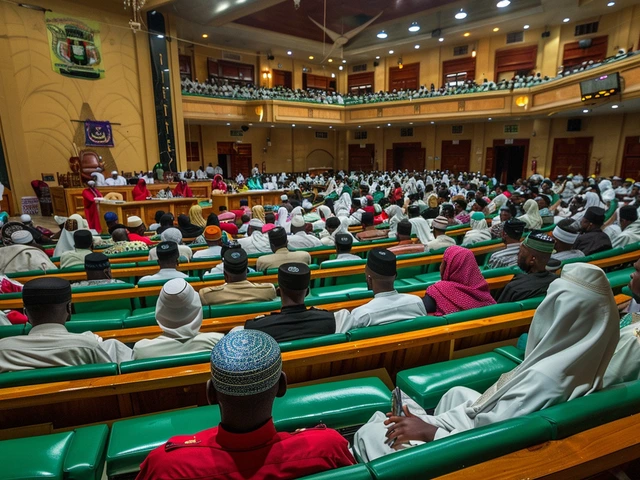New Pump Prices Announced by NNPC Ltd
The Nigerian National Petroleum Corporation (NNPC) Ltd recently disclosed the anticipated pump prices for Premium Motor Spirit (PMS) sourced from the Dangote Refinery for September 2024. This announcement is crucial amid the current state of fuel scarcity and surging prices in Nigeria, presenting a glimmer of hope for stabilization of petroleum prices once the Dangote Refinery becomes fully operational.
According to the statement released by NNPC Ltd, the corporation secured petrol from the Dangote Refinery at a basic cost of N898 per liter. These negotiated terms reflect ongoing international gasoline prices and prevailing foreign exchange rates, as stipulated under the Petroleum Industry Act (PIA). In terms of retail prices, there's quite a variation across different regions in Nigeria. For instance, residents in Lagos will be paying N950.22 per liter, while those in Oyo will see a slightly higher price of N960.22 per liter. Meanwhile, consumers in Abuja and Kaduna can expect to pay N992.22 per liter. The highest price was recorded in Borno at N1,019.22 per liter.
Factors Influencing the Pricing
The pricing model employed by NNPC Ltd takes into account a variety of factors, including the international gasoline rates and the foreign exchange rate. Another significant factor is that the transactions between NNPC and Dangote Refinery for September 2024 are settled in USD. This arrangement will transition to Naira transactions beginning October 1, 2024. Such pricing decisions are crucial for the corporation to align with the global market trends while also adhering to the regulations set forth in the Petroleum Industry Act.
Olufemi Soneye, the Chief Corporate Communications Officer of NNPC Ltd, assures the public that any discounts negotiated with the Dangote Refinery will be entirely transferred to consumers. This move aims to cushion the impact of high fuel costs on the general populace. This price announcement comes at a time when Nigeria is grappling with significant fuel scarcity and escalating prices, triggering widespread concern among citizens. The role of Dangote Refinery in this context is pivotal; it is expected to be a game-changer in the industry upon reaching full operational capacity.

Implications for the Nigerian Public
The public's response to the announced prices is anticipated to be mixed. While some may appreciate the transparency and the potential for price stabilization in the future, others may find the current prices still excessively high. Given that Nigeria is an oil-rich country, the expectation is generally that fuel prices should be more affordable. However, various underlying factors, including geopolitical influences and the country's economic policies, contribute to the current pricing structure.
It's also worth noting that the commencement of local Naira transactions with the Dangote Refinery could have a longer-term impact on the nation's economy. Such transactions would still need to address any fluctuations in the exchange rate, but the shift could provide a more stable framework for domestic fuel pricing. For the average Nigerian consumer, understanding these dynamics can be somewhat challenging, but the commitment from NNPC Ltd to pass on any savings is a reassuring gesture.
The Bigger Picture
Looking ahead, the broader impact of these price adjustments and the operational status of the Dangote Refinery will be imperative to monitor. The refinery is expected to produce a significant volume of petroleum products, potentially transforming Nigeria from a large-scale importer to a net exporter of petroleum products. This shift could not only stabilize domestic prices but also enhance Nigeria's position in the global petroleum market. The role of NNPC Ltd in facilitating this transition and ensuring transparency in pricing cannot be understated.
Given these developments, stakeholders and industry watchers will be keenly observing how the market adjusts and the subsequent reactions of consumers. The ultimate goal remains to provide much-needed stability and affordability in the petroleum sector, benefiting both the economy and the daily lives of Nigerian citizens.







Damian Liszkiewicz
Hey folks 😊, the new pump pricing from Dangote looks promising, especially if the promised discounts truly trickle down to consumers. It's a step towards transparency, which we desperately need in the Nigerian fuel market. Let's keep an eye on how the shift to Naira transactions plays out in October. 🌍
Angela Arribas
Actually, the article misstates the base cost – it should be N898 per litre, not "N898 per liter". Also, the grammar around "once the Dangote Refinery becomes fully operational" is clumsy. Please proofread next time. :)
Sienna Ficken
Oh great, another “glimmer of hope” that’ll probably fade faster than a cheap LED. The price spread from Lagos to Borno reads like a bad quiz on Nigerian geography. 🎨
Zac Death
Look, I get the excitement about the Dangote Refinery finally churning out fuel at competitive rates, but we have to stay grounded in reality. The basic cost of N898 per litre is already a hefty burden for many families, especially when you factor in transport costs and inflation. Even if NNPC passes the discount downstream, the regional price disparities-Lagos at N950.22, Borno at over N1,019.22-show systemic issues beyond raw procurement costs. The shift to Naira settlements in October might sound like a patriotic move, yet it introduces exchange‑rate volatility that could backfire when the naira weakens. Moreover, the PIA’s pricing guidelines are often interpreted loosely, giving room for markup by intermediaries. We also need to consider that the refinery’s capacity isn’t fully operational yet, so supply constraints could persist longer than projected. In the long run, a stable domestic supply could lower import dependence, but only if the output meets quality standards and distribution pipelines are upgraded. The government must also address the bureaucratic bottlenecks that slow fuel allocation to remote states. Transparency in the accounting of subsidies would go a long way in building public trust. Let’s not forget the role of foreign exchange policy; if the central bank tightens liquidity, fuel imports could become more expensive despite local production. Community outreach programmes from NNPC could help explain the pricing mechanics to the average consumer, demystifying the jargon that often clouds public perception. The anticipated price stabilization is a noble goal, yet it hinges on consistent policy implementation and a resilient macro‑economic environment. As we watch the price tags evolve, remember that fuel affordability is intertwined with broader issues like employment, electricity generation, and even food prices. So, while we celebrate the progress, let’s also keep demanding accountability at every step. Only then can Nigeria truly reap the dividends of its oil wealth. 🚀
Lizzie Fournier
Totally agree, Zac! The pricing maze is real, and you nailed the need for clear communication. Let’s hope NNPC truly walks the talk. 🙌
JAN SAE
Team, keep your heads up! The new numbers might look steep, but they're a baseline we can improve upon, especially if we push for better distribution logistics. Remember, every drop saved is a win for the community!,,
Steve Dunkerley
The current price structure reflects upstream cost‑plus margins, downstream distribution fees, and exchange‑rate risk premiums. Aligning these components will require revisiting the contractual terms with Dangote under the PIA framework. In short, the jargon is justified by the economics.
Jasmine Hinds
lol these numbers are wild 😅 but we’ll see 🙃
Madison Neal
From a stakeholder perspective, the transition to naira settlements could streamline budgeting for local enterprises, assuming the FX spread remains manageable. It's a nuanced shift that deserves close monitoring.
John Crulz
Honestly, the price gap between Lagos and Borno feels like a micro‑cosm of Nigeria’s broader infrastructural divide. If the refinery can supply uniform fuel, maybe the gap can narrow.
Anita Drake
Great observation, John. Bridging that geographic disparity is essential for equitable economic development, and fuel pricing is a critical lever.
Eduardo Lopez
Well, folks, another day, another price announcement. Let’s hope the public finally gets a break, because the drama of endless hikes is getting old. No emojis needed, just facts.
Nancy Perez de Lezama
While I appreciate the effort, the numbers remain unacceptable.
Matt Heitz
Patriots must demand that national assets like the Dangote Refinery serve our people first, not foreign investors. The current pricing scheme seems to favor elites, and we cannot tolerate that. It's time to hold NNPC accountable and push for a truly Nigerian‑centric fuel policy.